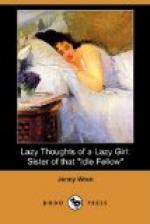There is the youth who looks as if he were going to favor us with a sweet treble. Lo, and behold! he opens his mouth, and out comes a loud double bass voice that seems to spring somewhere from the region of his boots. It is not a pretty sound by any means.
There is the smiling, simpering girl who comes forward gorgeously arrayed in light blue satin. She chooses a song, all trills and little scales, running up and down, shaking at last upon a high note for nearly two minutes, and then coming down with a rush. This brings down the house. We applaud lustily; we begin the encoring business here, which, having once started, we do not intend to give up again. We like to get as much as we can for our money, we Britons. She keeps us waiting some time, too—taking a little refreshment in between, perhaps—and then comes back beaming with smiles and, under the impression that she is a second Patti, shrieks out in plaintive tones, “Home, sweet home!” A cat might as well try to emulate a thrush! And we never find it “sweet” either. Never do you dislike “Home” more than when you hear it sung thus.
There is the sentimental man, who gets into position while the introduction to his song is being played. He sticks his finger down his collar (the object of which I can never understand), pulls both cuffs out, stretches out his music a yard or two in front of him and gazes above the audience with a hungry yearning look. His is always a love song, an unhappy love song, that should bring tears to our eyes, only we are so taken up with his expression, and the fear that he is going to die or have a fit, that we have no time for weeping. True to our instincts, he is greeted with deafening applause, and coming back, he generously treats us to the last verse over again.
Everyone is not so fortunate in receiving an encore, though. It depends on how well they are known, not on their desserts. The newcomer in the neighborhood tries her hardest and does her best, but as we have never seen her before we scarcely take the trouble to applaud her, which must be rather disappointing, especially when her mother is sitting among the audience with the encore song on her lap, ready to hand it up.
The best exhibition of all is made by the flutist. He is the only one who plays that instrument for miles round, and so the swagger with which he steps on to the platform is perhaps excusable.
How anyone can play it I do not know. It is such a singularly unbecoming instrument. But the wretched owner never seems to think so. When he once commences he gives us a good dose of it. We begin to think he is going on all night. Suddenly there comes a pause, and applause is started at once, we being only too delighted to make a little noise on our own account. But no—it is a mistake, a delusion, after all. The pause was only an interval between an Andante and a Scherzo; and, with a bland smile at his ovation, on he goes




